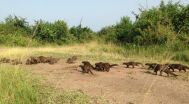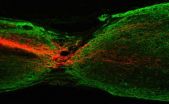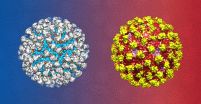Romeo and Juliet roles for banded mongooses
Banded mongooses take extraordinary risks to ensure that they find the right mate
2015-07-03
(Press-News.org) Banded mongooses take extraordinary risks to ensure that they find the right mate.
Female banded mongooses risk their lives to mate with rivals during pack 'warfare' and both males and females have also learned to discriminate between relatives and non-relatives to avoid inbreeding even when mating within their own social group.
Researchers from the University of Exeter and Liverpool John Moores University found that 18% of wild banded mongoose pups are fathered by males from rival packs.
Banded mongooses are found living in stable social groups across Central and Eastern Africa. They are highly social, with most individuals remaining in their natal pack surrounded by relatives for their whole lives.
Dr Hazel Nichols, lead author of the study, from Liverpool John Moores University said: "These pups are less likely to be inbred, are heavier and have higher survival chances than their within-pack counterparts. However, their mothers risk a lot to mate with extra-pack males; aggressive encounters between packs account for 20% of pup deaths and 12% of adult deaths."
"Banded mongooses aren't the only animals that fight with rival packs. Humans, for example often engage in warfare. However banded mongooses are unusual because a lot of mating occurs during these fights, even though it is a dangerous time to decide to mate with one of your rivals!"
Dr Jennifer Sanderson, from the Centre for Ecology and Conservation at the University of Exeter's Penryn Campus in Cornwall, who co-authored the study said: "The most exciting thing we found is that females are more likely to mate with males from rival packs if they are surrounded by unsuitable mates - such as their brothers and uncles - in their own pack. When this happens, they are much more likely to take the risk of mating with a male from another pack."
The study forms part of a 20 year project, led by Professor Michael Cant from the University of Exeter.
'Adjustment of costly extra-group paternity according to inbreeding risk in a cooperative mammal' by Hazel Nichols, Michael Cant, and Jennifer Sanderson is published in the journal Behavioral Ecology.
INFORMATION:
Contact
University of Exeter Press Office
+44(0)1392 722 062 / +44(0)7827 309 332
Twitter: @UoE_ScienceNews
For urgent enquiries outside normal office hours please ring +44(0)7867 536 750 or email pressoffice@exeter.ac.uk
About the University of Exeter
The University of Exeter is a Russell Group university and in the top one percent of institutions globally. It combines world-class research with very high levels of student satisfaction. Exeter has over 19,000 students and is ranked 7th in The Times and The Sunday Times Good University Guide league table, 10th in The Complete University Guide and 9th in the Guardian University Guide 2015. In the 2014 Research Excellence Framework (REF), the University ranked 16th nationally, with 98% of its research rated as being of international quality. Exeter was The Sunday Times University of the Year 2012-13.
The University has four campuses. The Streatham and St Luke's campuses are in Exeter and there are two campuses in Cornwall, Penryn and Truro. The 2014-2015 academic year marks the 10-year anniversary of the two Cornwall campuses. In a pioneering arrangement in the UK, the Penryn Campus is jointly owned and managed with Falmouth University. At the campus, University of Exeter students can study programmes in the following areas: Animal Behaviour, Conservation Biology and Ecology, English, Environmental Science, Evolutionary Biology, Geography, Geology, History, Human Sciences, Marine Biology, Mining and Minerals Engineering, Politics and International Relations, Renewable Energy and Zoology.
The University has invested strategically to deliver more than £350 million worth of new facilities across its campuses in the past few years; including landmark new student services centres - the Forum in Exeter and The Exchange at Penryn - together with world-class new facilities for Biosciences, the Business School and the Environment and Sustainability Institute. There are plans for another £330 million of investment between now and 2016.
http://www.exeter.ac.uk/cornwall
About the University of Exeter's Centre for Ecology and Conservation (CEC)
Staff at the Centre for Ecology and Conservation, based on the Penryn Campus, undertake cutting-edge research that focusses on whole organism biology. The CEC has three interlinked research groups: Behaviour, Ecology and Conservation, and Evolution which constitute 40 academics and over 100 early career researchers. It engages widely with businesses, charities and government agencies and organisations in Cornwall, the Isles of Scilly and beyond to translate its research into societal impact. Staff at the CEC deliver educational programs to some 500 undergraduate and 100 postgraduate students.
A new £5.5 million Science and Engineering Research Support Facility (SERSF) is currently under construction at the Penryn Campus. The facility will bring pioneering business, science and engineering together and will provide space for the growing CEC alongside the University of Exeter Business School, which is expanding into Cornwall, and the University's Marine Renewables team.
The University of Exeter and Falmouth University are founding partners in the Combined Universities in Cornwall (CUC), a unique collaboration between six universities and colleges to promote regional economic regeneration through Higher Education, funded mainly by the European Union (Objective One and Convergence), the South West Regional Development Agency and the Higher Education Funding Council for England, with support from Cornwall Council.
http://biosciences.exeter.ac.uk/cec/
[Attachments] See images for this press release:

ELSE PRESS RELEASES FROM THIS DATE:
2015-07-03
For the first time gene therapy for cystic fibrosis has shown a significant benefit in lung function compared with placebo, in a phase 2 randomised trial published in The Lancet Respiratory Medicine journal. The technique replaces the defective gene response for cystic fibrosis by using inhaled molecules of DNA to deliver a normal working copy of the gene to lung cells.
"Patients who received the gene therapy showed a significant, if modest, benefit in tests of lung function compared with the placebo group and there were no safety concerns," said senior author Professor ...
2015-07-02
LAWRENCE -- A new study that is the first to use Social Security Administration's personal income tax data tracking the same individuals over 20 years to measure individual lifetime earnings has confirmed significant long-term economic benefits of college education.
ChangHwan Kim, a University of Kansas researcher, said the research team was also able to account for shortcomings in previous studies by including factors such as gender, race, ethnicity, place of birth and high school performance that would influence a person's lifetime earnings and the probability of college ...
2015-07-02
DALLAS, July 2, 2015 -- An emergency room rapid response plan for children can help diagnose stroke symptoms quickly, according to new research in the American Heart Association journal Stroke.
"Just as there are rapid response processes for adults with a possible stroke, there should be a rapid response process for children with a possible stroke that includes expedited evaluation and imaging or rapid transfer to a medical center with pediatric stroke expertise," said Lori Jordan, M.D., Ph.D., study senior author and an assistant professor of pediatrics and neurology ...
2015-07-02
Researchers at the Hong Kong University of Science and Technology (HKUST) have found a way to stimulate the growth of axons, which may spell the dawn of a new beginning on chronic SCI treatments.
Chronic spinal cord injury (SCI) is a formidable hurdle that prevents a large number of injured axons from crossing the lesion, particularly the corticospinal tract (CST). Patients inflicted with SCI would often suffer a loss of mobility, paralysis, and interferes with activities of daily life dramatically. While physical therapy and rehabilitation would help the patients to ...
2015-07-02
Washington, D.C. - July 2, 2015 - Male fruit flies infected with the bacterium, Wolbachia, are less aggressive than those not infected, according to research published in the July Applied and Environmental Microbiology, a journal of the American Society for Microbiology. This is the first time bacteria have been shown to influence aggression, said corresponding author Jeremy C. Brownlie, PhD, Deputy Head, School of Natural Sciences, Griffith University, Brisbane, Australia.
The research began with a discovery by University of Arizona student Elizabeth Bondy, an undergraduate ...
2015-07-02
Astronomers are gearing up for high-energy fireworks coming in early 2018, when a stellar remnant the size of a city meets one of the brightest stars in our galaxy. The cosmic light show will occur when a pulsar discovered by NASA's Fermi Gamma-ray Space Telescope swings by its companion star. Scientists plan a global campaign to watch the event from radio wavelengths to the highest-energy gamma rays detectable.
The pulsar, known as J2032+4127 (J2032 for short), is the crushed core of a massive star that exploded as a supernova. It is a magnetized ball about 12 miles ...
2015-07-02
MINNEAPOLIS - A new study suggests that genes may not be to blame for the increased risk of heart disease some studies have shown in people with migraine, especially those with migraine with aura. The research is published during Headache/Migraine Awareness Month in the inaugural issue of the journal Neurology® Genetics, an open access, or free to the public, online-only, peer-reviewed journal from the American Academy of Neurology. Aura are sensations that come before the headache, often visual disturbances such as flashing lights.
"Surprisingly, when we looked ...
2015-07-02
BOSTON -- A new study led by scientists at Beth Israel Deaconess Medical Center (BIDMC) shows that an HIV-1 vaccine regimen, involving a viral vector boosted with a purified envelope protein, provided complete protection in half of the vaccinated non-human primates (NHPs) against a series of six repeated challenges with simian immunodeficiency virus (SIV), a virus similar to HIV that infects NHPs. These findings are published online today in Science.
Based on these pre-clinical data, the HIV-1 version of this vaccine regimen is now being evaluated in an ongoing Phase ...
2015-07-02
One more piece and we are done! A research team led by the Duke-NUS Graduate Medical School Singapore (Duke-NUS) has found the second-to-last piece of the puzzle needed to potentially cure or treat dengue. This is welcome news as the dengue virus infects about 400 million people worldwide annually, and there is currently no licensed vaccine available to treat it.
Associate Professor Shee-Mei Lok and Research Fellow Guntur Fibriansah, from the Duke-NUS Emerging Infectious Diseases (EID) Programme, led research that showed how an antibody neutralises dengue virus serotype ...
2015-07-02
In a new Science study, Duke-NUS Graduate Medical School Singapore (Duke-NUS) scientists have identified how small changes in dengue's viral genome can affect the virus' ability to manipulate human immune defences and spread more efficiently. This research is the first of its kind that examined the dengue virus starting from broad population level observations and then linked it to specific molecular interactions, to explain an outbreak. This work provides a framework for identifying genomic differences within the virus that are important for epidemic spread.
Dengue virus ...
LAST 30 PRESS RELEASES:
[Press-News.org] Romeo and Juliet roles for banded mongooses
Banded mongooses take extraordinary risks to ensure that they find the right mate



